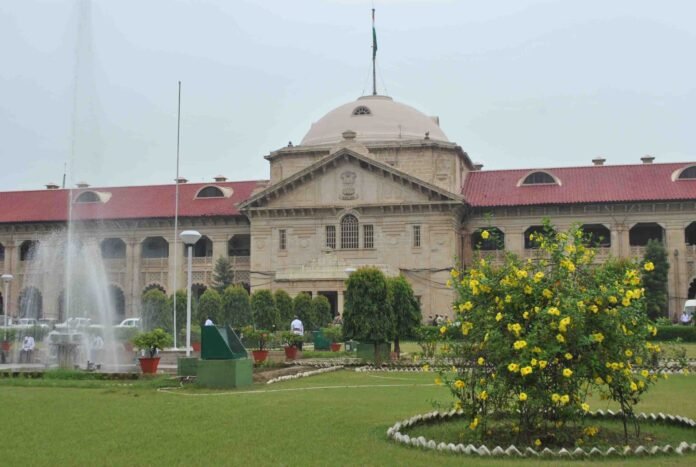The Allahabad High Court has taken a significant step in addressing the issue of dowry-related crimes by directing the Uttar Pradesh government to provide clarity on the appointment of Dowry Prohibition Officers. In response to concerns regarding the enforcement of the Dowry Prohibition Act, the court has requested the state government to submit an affidavit confirming whether Dowry Prohibition Officers have been appointed to oversee compliance with the provisions of the Act.
The Dowry Prohibition Act, enacted to curb the practice of dowry and related offenses, mandates the appointment of Dowry Prohibition Officers at various levels to monitor and enforce the law effectively. These officers play a crucial role in investigating complaints of dowry harassment, ensuring legal action against offenders, and providing support to victims of dowry-related violence.
The directive from the Allahabad High Court underscores the importance of ensuring the proper implementation of the Dowry Prohibition Act to address the growing incidence of dowry-related crimes in the state. With dowry-related cases on the rise, the appointment of Dowry Prohibition Officers becomes imperative to effectively tackle this social menace and protect the rights of vulnerable individuals, particularly women.
The court’s intervention serves as a reminder of the state government’s responsibility to uphold the rule of law and safeguard the interests of its citizens. By seeking clarification on the appointment of Dowry Prohibition Officers, the court aims to hold authorities accountable for their obligations under the Dowry Prohibition Act and ensure the effective enforcement of its provisions.
Furthermore, the court’s directive reflects a proactive approach towards addressing issues of gender-based violence and discrimination prevalent in society. Dowry-related offenses not only violate the rights of women but also perpetuate harmful gender stereotypes and inequalities. Therefore, it is imperative for the state to take concrete measures to combat this entrenched social problem and promote gender equality and justice.
As the Allahabad High Court seeks accountability from the Uttar Pradesh government, it sends a clear message that the protection of women’s rights and the prevention of dowry-related crimes are non-negotiable priorities. The court’s scrutiny of the state’s compliance with the Dowry Prohibition Act underscores the need for concerted efforts at both the judicial and administrative levels to eradicate the scourge of dowry from society.
Expanding further on the significance of the Allahabad High Court’s directive, it’s crucial to delve into the broader context of dowry-related issues in India and the importance of proactive measures to address them. Dowry, a deeply ingrained social practice, continues to exert a harmful influence on Indian society, perpetuating gender discrimination, violence against women, and economic disparities.
Despite the enactment of stringent laws such as the Dowry Prohibition Act, dowry-related crimes persist across the country, with Uttar Pradesh being no exception. Cases of dowry harassment, dowry deaths, and other forms of dowry-related violence are reported with alarming frequency, highlighting the urgent need for effective intervention and enforcement of legal provisions.
The appointment of Dowry Prohibition Officers is a critical step in this regard, as these officials are tasked with monitoring and enforcing compliance with the Dowry Prohibition Act at the grassroots level. By overseeing investigations into dowry-related complaints, facilitating legal proceedings, and providing support to victims, Dowry Prohibition Officers play a pivotal role in combating the scourge of dowry and ensuring justice for those affected.
However, the effectiveness of Dowry Prohibition Officers depends not only on their appointment but also on adequate training, resources, and support from the state government. Training programs to familiarize officers with the provisions of the Dowry Prohibition Act, investigative techniques, and victim support services are essential to enhance their effectiveness in tackling dowry-related crimes.
Moreover, Dowry Prohibition Officers must be equipped with the necessary infrastructure and logistical support to carry out their duties effectively. This includes access to legal assistance, forensic facilities, and counseling services for victims, as well as coordination with other law enforcement agencies and social welfare organizations.
In addition to enforcement measures, efforts to combat dowry-related crimes must also address the underlying socio-cultural factors that perpetuate the practice of dowry. Education and awareness campaigns aimed at challenging traditional gender roles, promoting gender equality, and empowering women economically are crucial to shifting societal attitudes and norms surrounding dowry.
Furthermore, collaboration between government agencies, civil society organizations, and community leaders is essential to create a comprehensive and coordinated response to dowry-related issues. By fostering partnerships and leveraging collective resources and expertise, stakeholders can work together to prevent dowry-related crimes, support victims, and promote a culture of gender equity and justice.

